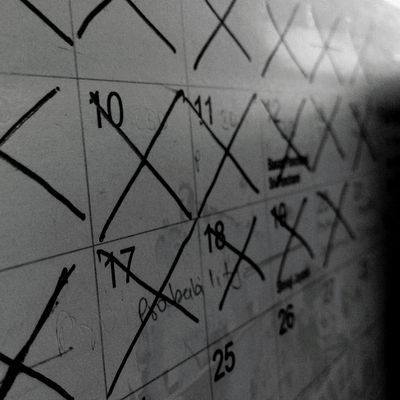
Here is the order in which I listen to new episodes from the various podcasts to which I’m subscribed: tier B (shows I mostly like but sometimes find boring), tier C (shows I find occasionally engaging but which serve mainly to fill silence), and, finally, tier A (shows I actually love). I do the same thing with TV shows, too — when a new season of a show I love becomes available to stream, I often put it off for weeks, even months, before finally allowing myself to watch it. Sometimes, I forget altogether. I can’t tell you how many movies I told myself to watch once they became available to rent that I’ve never seen, because I never wrote them down. It’s like hoarding, except instead of trash bags and cat litter, I’m stockpiling actual pleasant experiences.
Only recently did it occur to me that this is a demented way to behave. Why won’t I let myself do something I know I’ll enjoy as soon as the option becomes available to me? What kind of masochist procrastinates doing fun things?
In a paper published in 2010 in the Journal of Marketing Research, co-authors Suzanne B. Shu and Ayelet Gneezy examined this exact tendency, arguing that putting off both unpleasant and pleasant experiences involves a similar mental calculation. Comparing signing up for an employer’s health-care plan with scheduling a trip to a local art exhibit, Shu and Gneezy write that “the effort required to complete the activity appears small when it is far off, making it easy for a person to imagine completing it sometime in the future.” Using data collected from a Fortune 500 company and the Museum of Contemporary Art in San Diego, the authors found that only rarely do people complete either task unless they’re given a fixed time frame in which to do so — graphs for both sets of data showed similar spikes in completion in the final days before an imposed deadline. Of course, one of these patterns is more intuitive than the other. If you want to go to the museum, why don’t you just go?
Part of it, Gneezy, an associate professor of marketing at UC–San Diego, tells me, is an inherent belief something researchers call “resource slack,” or the perception that we’ll have more of a given resource (in this case, time) in the future. As an example, Gneezy imagines trying to find time to use a gift card for a massage. “I’ll look at my schedule for today, and it looks really bad. So does tomorrow, and actually, next week as well,” she explains. “So I’ll say okay, I’ll look two weeks from now. It looks like I’ll have time then. But clearly, when two weeks from now arrives, I’m just as busy.” Given that most of us consider ourselves busy at any given time, the perfect opportunity may never arrive, and so the thing we supposedly want to do continues to be postponed. In some cases, as with gift cards, the opportunity expires before we ever take advantage of it. Even when the item in question doesn’t technically expire, as with podcasts or books, the desired experience may get buried under more and more desired experiences, at which point some of those experiences must be abandoned. There are books on my shelf I am sure I’ll never read, simply because there are too many on the metaphorical — okay, literal — pile above them.
Then there is also the paradox in “savoring,” procrastination’s snobby cousin. The popular example here is the expensive bottle of wine being saved for just the right occasion. In 2007, Washington Journal columnists Dorothy J. Gaiter and John Brecher created “Open That Bottle Night,” or OTBN, to be celebrated the last Saturday of February every year, explicitly granting us permission to “finally drink that wine that is otherwise simply too special to open.” As someone hiding several slices of her favorite birthday cake from November of last year in my freezer, I can relate.
Gneezy adds that another common form of savoring takes place in our closets. “Last year I was in Europe and I bought boots, and I never wore them,” she says. “I was waiting for this perfect event. But they sat in my closet for a year.” The main problem here is that the perfect event never arrives — or if it does, it shows up unannounced. We save these things imagining a future, idealized version of ourselves, or our lives, when the truth is we mainly stay us, ordinary and imperfect.
Besides, says Gneezy, “savoring” or procrastinating enjoyable experiences can actually lessen our eventual enjoyment of them. If the thing you’re putting off is only okay, or just pretty good, you’re bound to be disappointed. And even if that thing does turn out to be as fun as you’ve built yourself up to expect, you’ll only be mad you didn’t do it sooner. Life is short. Wear the boots/drink the wine now, while you still can. As for me, I’m off to listen to my tier A podcasts!! Oh my God, what a sad sentence. Let us never put ourselves in this position again.





